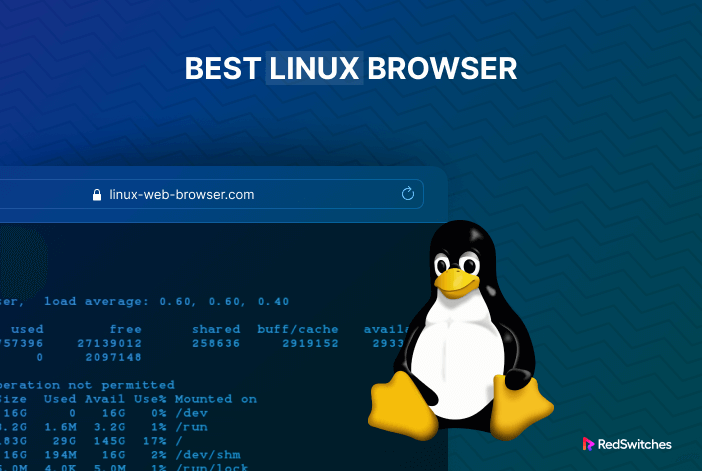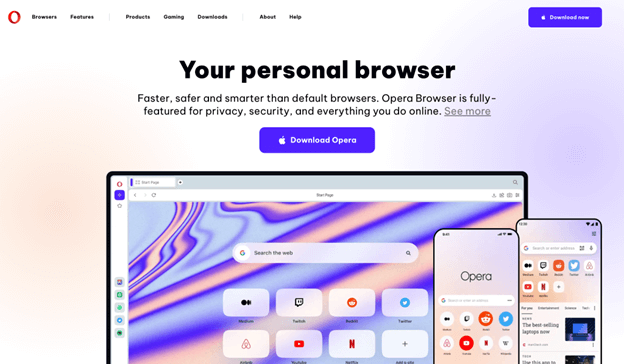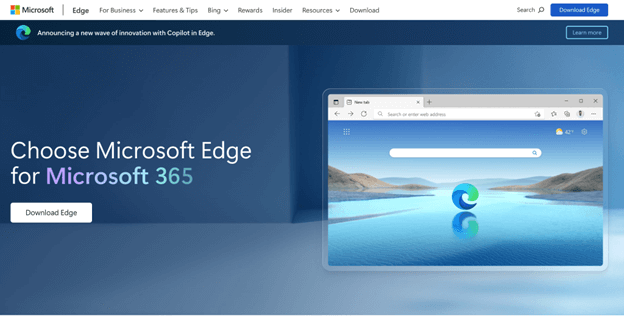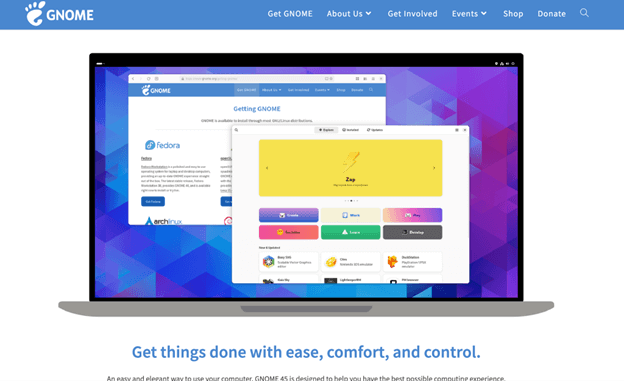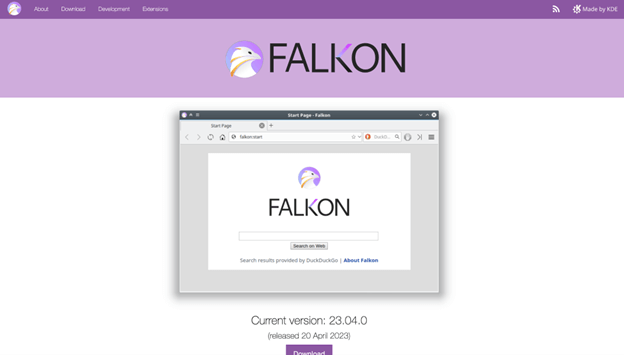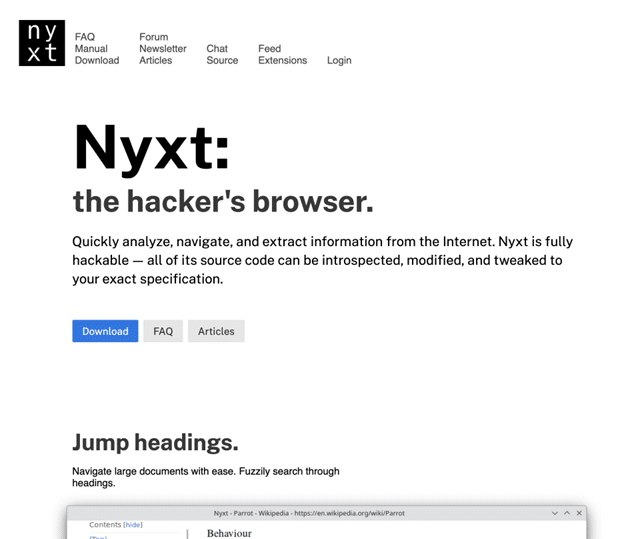Chrome remains one of the most used browsers, taking 59% of the market share. However, is it the best Linux browsers for you? Picking the best browser is crucial since it’s the most used software on any computer. It helps with research, online entertainment, and accessing work apps on the cloud.
So, how do you find the best browser for Linux? While the choice is selective, consider factors like performance, features, security, customization, extension ecosystem, and ease of use. With Linux being an open-source OS, you could also look into a browser’s transparency and compatibility with the UNIX system.
This blog discusses the ten best browsers for Linux tailored to perfection. We will review their features, security measures, performance metrics, and more factors that make them ideal for Linux.
Table of Contents
- What is Linux?
- Vivaldi
- Mozilla Firefox
- Chromium
- Google Chrome
- Brave Browser
- Opera
- Microsoft Edge
- GNOME Web or Epiphany
- Falkon
- Nyxt
- Conclusion
- FAQs
What is Linux?
Linux is a community-developed, UNIX-like, open-source OS built for desktops, laptops, mobile phones, embedded devices, servers, and mainframes. It is versatile because it can run on numerous platforms, including SPARC, ARM, and X86.
The OS is also the most reliable computer ecosystem globally, owing to its incredible stability and frequent security patches. Furthermore, Linux has a vast and supportive community that continually works to make it better and enhance its security.
Why Choose Custom Browsers for Linux?
The most significant benefit that a custom Linux web browser has is that it suits your needs, preferences, and browsing habits. Whatever your priority is, from privacy and security to minimal weight and efficiency, you can find a custom browser that guarantees it. While default browsers are built to suit everyone, the options perfect only one or a few features.
Key Features to Consider
When selecting the best web browser for Linux, you must consider several factors. These include:
- Speed and performance: Linux runs on various hardware and requires a browser with optimal efficiency and performance. The faster and more responsive a browser is, the smoother the experience it offers on multiple devices and hardware configurations.
- Linux compatibility: There are numerous Linux distributions, and a compatible browser should offer a consistent experience across this diversity. It should blend seamlessly with Linux environments, respecting design guidelines and user settings.
- Security and privacy. Security and privacy are huge priorities of the Linux community. A great browser should have superb protection against online threats and ensure maximum confidentiality. An open-source browser is particularly great since it allows users to review its code for potential security risks.
- Compatibility with web technologies. A browser built for UNIX/Linux should support the latest web standards and features. This ensures you can access modern web content for a fantastic browsing experience.
- Rendering engine. Various rendering engines affect how you see and interact with content. Aspects like performance, compatibility, and familiarity with a particular engine affect the choice of a Linux best browser.
- User interface (UI) and customizability The Linux ecosystem encourages personalization, and being able to customize various aspects of the best Linux browser is essential. This includes extensions, themes, UI aspects, and bookmarks.
- Tab management. The Linux ecosystem greatly enhances multitasking, often requiring multiple tabs to be open simultaneously. The best Linux browsers should have excellent tab management to improve your ability to work on various projects simultaneously.
Now that you understand the basic criteria of choosing the best Linux browser for your needs, let’s look at the 10 best options.
1. Vivaldi
Credit: Vivaldi
While relatively new, Vivaldi has garnered plenty of attention from Linux users lately. This feature-rich and aesthetically pleasing browser is based on Chromium and was established by Vivaldi Technologies in 2015. It offers a superb browsing experience, allowing you to customize most aspects, block trackers, and set privacy options. It’s also inferred to use fewer resources compared to Chrome.
How to Install Vivaldi on Linux?
On Linux Mint, Ubuntu, and Debian:
- Type this code $ wget -qO- https://repo.vivaldi.com/archive/linux_signing_key.pub | sudo apt-key add – and press Enter
- Next type $ sudo add-apt-repository ‘deb https://repo.vivaldi.com/archive/deb/ stable main’ to get the repository
- Lastly, type in $ sudo apt update && sudo apt install Vivaldi-stable to install Vivaldi
On AlmaLinux, RHEL, CentOS, Rocky, and Fedora:
- Type in the following code in your terminal $ sudo dnf config-manager –add-repo https://repo.vivaldi.com/archive/vivaldi-fedora.repo
- Then place this code $ sudo dnf install Vivaldi-stable and press enter
Who Is It Ideal For?
Vivaldi is the best Linux browser for people who value customizability and plenty of features. It’s designed for those who want to tailor their browsing experience to match their preferences.
Below are some of the aspects that make it appealing to this user base:
- Customizability: Vivaldi offers extensive customization options, allowing users to personalize themes, UI aspects, and more.
- Tab management: Features like Tab Stacking make it efficient for users who work with multiple tabs simultaneously.
- Productivity enhancements: Vivaldi’s customization options help users manage their workflow effectively.
2. Mozilla Firefox
Credit: Mozilla Firefox
Initially released in 2004, Mozilla Firefox is a swift and secure browser available for various operating systems like Android, Windows, Linux, OS X, and Solaris. It is highly customizable, featuring an unmatched catalog of add-ons and themes. Being an open-source and privacy-oriented browser, Firefox allows you to enjoy ultra-modern web-browsing capabilities while prioritizing your privacy and security.
How to Install Firefox on Linux?
Being the most popular Linux browser and the third most popular browser worldwide, Firefox ships with most Linux distros. However, if it is not already pre-installed, you can run the following, depending on your distribution:
Step 1: $ sudo zypper install firefox [On OpenSUSE]
Step 2: $ sudo pacman -S firefox [On Arch Linux]
Step 3: $ sudo apt add firefox [On Alpine Linux]
Step 4: $ sudo emerge -a www-client/firefox [On Gentoo Linux]
Step 5: $ sudo apt install firefox [On Debian, Ubuntu and Mint]
Step 6: $ sudo yum install firefox [On RHEL/CentOS/Fedora and Rocky Linux/AlmaLinux]
Who It’s Ideal For?
Firefox is ideal for users who prioritize privacy and security while seeking a customizable browsing experience.
Below are some aspects that endear it to this user base:
- An Enhanced Protection feature. This tool shields you from trackers that follow you around the web. The browser’s parent company is also known for its prioritization of security. Hence, you are assured of having no one snooping around your affairs.
- Extensive add-ons. The vast library of customization options allows Firefox users to customize their browsing experience fully.
- Efficiency. For Google Chrome users with a computer that lacks plenty of power and resources, Firefox is the perfect alternative. It does not consume as much power as Chrome while still accomplishing plenty of work.
3. Chromium
Credit: Chromium
Widely acknowledged as the alternative for Google Chrome and other Chrome-based browsers, Chromium is incredibly popular among Linux users. This open-source, secure, and stable web browser is written in C++ and runs on OS X, Android, Linux, and Windows. Its most admirable features include history and session management, WebM codecs for HTML5 Audio and Video, Theora, support for Vorbis, and a tabbed window manager.
How to Install Chromium on Linux?
Here are the steps to install Chromium on Linux:
Installing Chromium on Fedora:
Command: $ sudo dnf install chromium
Installing Chromium on Linux Mint, Ubuntu & Debian:
Command: $ sudo apt-get install chromium-browser
Installing Chromium on other Linux distros:
Step 1: $ sudo pacman -S chromium [On Arch Linux]
Step 2: $ sudo apt add chromium [On Alpine Linux]
Step 3: $ sudo zypper install chromium [On OpenSUSE]
Step 4: $ sudo emerge -a www-client/chromium [On Gentoo Linux]
Who Is It Ideal For?
Chromium is a great Linux browser for developers and advanced users looking for a flexible and compatible browsing platform.
Below are some reasons why this browser makes sense for these types of users:
- Developer friendliness. Chromium has a flexible codebase that you can use to create browsers that collect your data and hinder advertisers and Google from gathering information related to your online behavior.
- Enhanced compatibility. The browser is highly compatible with development tools and allows you to test websites and web applications on a Linux ecosystem.
4. Google Chrome
Credit: Google Chrome
Developed by Google, Chrome is currently the most popular web browser in the PC and smartphone market. It is forked from Chromium and structured with a few add-ons. Its most popular features include bookmarking and synchronization, a host of plugins in its Google Web Store, malware blocking, and enhanced security. Its inbuilt mechanism makes it incredibly fast and has excellent stability, with tabbed browsing, incognito mode, and speed dials.
How to Install Google Chrome on Linux?
Here are the steps to install Google Chrome on Linux
On Mint, Ubuntu, and Debian:
Step 1: $ wget https://dl.google.com/linux/direct/google-chrome-stable_current_amd64.deb
Step 2: $ sudo dpkg -i google-chrome-stable_current_amd64.deb
On AlmaLinux, Rocky, RHEL, and Fedora:
Step 1: $ wget https://dl.google.com/linux/direct/google-chrome-stable_current_x86_64.rpm
Step 2: $ sudo rpm -i google-chrome-stable_current_x86_64.rpm
Who Is It Ideal For?
Chrome is ideal for general users who rely on Google services, require fast performance, and seek seamless compatibility.
The aspects that make it ideal for these users include:
- Readiness for general use. Chrome is readily compatible with various web applications and websites. It also has a fast and efficient browsing performance and a user-friendly interface.
- Google Ecosystem. Chrome readily allows you to access your Gmail, Google Drive, Google Docs, and Contacts, among other Google services on Linux. It is also tightly integrated with the Google ecosystem, allowing stress-free data synchronization and settings across various devices. Such integration comes in handy when you rely on these services for communication, organization, and work.
5. Brave Browser
The Brave is a free, open-source browser based on Chromium. Back when it came out, it mainly became popular due to its Rewards Program, as it offers crypto tokens for browsing and receiving ads via push notifications. However, nowadays, it is largely known for its speed and focus on offering the best ad-free experience. The software effectively blocks ads and data-mining trackers, preventing Google and any third parties from accessing your private information and digital fingerprints.
How to Install Brave on Linux?
Here are the steps to install Brave on Linux
Installing Brave browser in Mint, Ubuntu, and Debian:
Step 1: $ sudo apt install curl
Step 2: $ sudo curl -fsSLo /usr/share/keyrings/brave-browser-archive-keyring.gpg https://brave-browser-apt-release.s3.brave.com/brave-browser-archive-keyring.gpg
Step 3: $ echo “deb [signed-by=/usr/share/keyrings/brave-browser-archive-keyring.gpg arch=amd64] https://brave-browser-apt-release.s3.brave.com/ stable main”|sudo tee /etc/apt/sources.list.d/brave-browser-release.list
Step 4: $ sudo apt update
Step 5: $ sudo apt install brave-browser
Who Is It Ideal For?
Brave is the best Linux browser for adventurous and tech-savvy Linux users interested in privacy, cryptocurrency rewards, and high performance.
The aspects that make it appealing to these users include:
- Cryptocurrency rewards. Brave’s BAT system allows users to win some tokens or gift them to their favorite creators. Crypto and blockchain technology enthusiasts are naturally drawn to the browser due to its integration of cryptocurrency-based incentives.
- Privacy Focus. Brave has many features to enhance privacy, including HTTPS Everywhere, aggressive ad blocking, and tracker blocking.
- Speed. For anyone looking to get the best performance, Brave runs on Java V8, a speedy JavaScript engine. However, it has an advantage over other browsers that use the same machine due to its ad- and tracker-blocking capabilities. These features reduce data usage and improve page load times, making Brave three times faster than Chrome.
6. Opera
Credit: Opera
Despite being one of the more innovative browsers, Opera has had a fairly low market share. It was released in 1995 and runs on all operating systems, including Linux, OS X, Windows, iOS, Android, and Symbian. One of Opera’s most innovative features is Page Zooming, which allows you to increase or decrease SVG, Java, and Flash according to your requirements. Other top features include deleting HTTP cookies, downloads manager, tabbed browsing, and speed dial for quick search.
How to Install Opera on Linux?
Here are the steps to install Opera on Linux
Installing on AlmaLinux, Rocky, RHEL, and Fedora:
Step 1: $ sudo rpm –import https://rpm.opera.com/rpmrepo.key
Step 2: $ sudo tee /etc/yum.repos.d/opera.repo <<RPMREPO
Step 3: [Opera] name=Opera packages type=rpm-md baseurl=https://rpm.opera.com/rpm gpgcheck=1 gpgkey=https://rpm.opera.com/rpmrepo.key enabled=1 RPMREPO
Step 4: $ sudo yum -y install opera-stable
Installing on Mint, Ubuntu, and Debian:
Step 1: $ sudo add-apt-repository ‘deb https://deb.opera.com/opera-stable/ stable non-free
Step 2: $ wget -qO – https://deb.opera.com/archive.key | sudo apt-key add –
Step 3: $ sudo apt update
Step 4: $ sudo apt install opera-stable
Who Is It Ideal For?
Opera browser is ideal for users who appreciate built-in features, customization, and a unique interface. This is due to the following aspects:
- Built-in features. Opera is known for its diverse built-in features, such as integrated messaging services, ad blocker, and a free VPN. It was also the first browser to incorporate the Speed Dial feature. This is why it is the best Linux browser for users who appreciate having inbuilt features, as they do not have to rely on extensions.
- Unique design. Opera also has a unique interface that can free you from the monotony of major browsers like Firefox and Chrome. From a customizable start page to the Speed Dial feature, numerous design elements make Opera visually peculiar.
- Gaming optimizations. Gamers also find Opera appealing due to the targeted features the browser comes with. This includes Twitch integration, RAM and CPU usage limits, and a customizable gaming-inclined design.
7. Microsoft Edge
Credit: Microsoft Edge
Edge is Microsoft’s answer to the stiff competition by Google Chrome and Mozilla Firefox. It is the default Windows browser and is available as a beta version on Linux but functions well. It offers all the basic functionalities expected of a browser but lacks several of the features available in its Windows version.
How to Install Microsoft Edge on Linux?
Here are the steps to install Microsoft Edge on Linux
Using a .rpm or .deb File to install Microsoft Edge:
Step 1: $ sudo rpm -i microsoft-edge-*.rpm [On Fedora/OpenSUSE]
Step 2: $ sudo dpkg -i microsoft-edge-*.deb [On Debian/Ubuntu/Mint]
Using Package Manager to install Microsoft Edge on Mint, Ubuntu, and Debian:
Step 1: $ curl https://packages.microsoft.com/keys/microsoft.asc | gpg –dearmor > microsoft.gpg
Step 2: $ sudo install -o root -g root -m 644 Microsoft.gpg /etc/apt/trusted.gpg.d/
Step 3: $ sudo sh -c ‘echo “deb [arch=amd64] https://packages.microsoft.com/repos/edge stable main” > /etc/apt/sources.list.d/Microsoft-edge-dev.list’
Step 4: $ sudo rm Microsoft.gpg
Step 5: $ sudo apt update
Step 6: $ sudo apt install Microsoft-edge-dev
Who Is It Ideal For?
Microsoft Edge is the best Linux browser for users within the Microsoft ecosystem, those who rely on Microsoft services for work and communication. Enterprise and business users also go for this browser.
The aspects that make it appealing to these users include:
- Microsoft integration. Edge readily allows you to easily access other Microsoft services and products, including Microsoft Teams and Microsoft Office. This integration ensures you can seamlessly handle your work, communications, and data across multiple devices.
- Business features. Business and enterprise users love to use Microsoft Edge because it offers several security features targeted at business environments. Consider, for instance, Microsoft Defender SmartScreen and group policies. Additionally, organizations relying heavily on Microsoft technologies could prefer to use Edge within their Linux ecosystems.
8. GNOME Web or Epiphany
Credit: Gnome
GNOME Web (Epiphany) is the best Linux browser for GNOME and Elementary OS, as it’s made with WebKit, offering a neat and orderly viewing experience. The browser was developed with usability in mind, which explains its Pantheon Desktop and integration into GNOME. An Intelligent Tracking Prevention feature and a pre-installed Ad Blocker are also available.
How to Install GNOME Web on Linux?
Below are the ways to install GNOME web or Epiphany browser on various Linux distros:
Step 1: $ sudo emerge -a www-client/epiphany [On Gentoo Linux]
Step 2: $ sudo apt install epiphany [On Debian, Ubuntu and Mint]
Step 3: $ sudo pacman -S epiphany [On Arch Linux]
Step 4: $ sudo apt add epiphany [On Alpine Linux]
Step 5: $ sudo yum install epiphany [On RHEL/CentOS/Fedora and Rocky Linux/AlmaLinux]
Step 6: $ sudo zypper install epiphany [On OpenSUSE]
Who Is It Ideal For?
Epiphany, or the GNOME web browser, is the best Linux browser for GNOME and Elementary OS users who prefer a clean and efficient browsing experience. This is due to the following aspects:
- Efficiency. The browser is designed to offer users a clean, no-frills interface. If you are looking for an efficient and fast browser and can do without resource-consuming extensions or skins, themes, and applications, Epiphany is a great choice.
- GNOME Integration: It aligns with the design principles of GNOME and Elementary OS.
9. Falkon
Credit: Falkon
Developed by the KDE team, Falkon is a fairly new web browser that originated from a research project and was first launched in 2010. It was originally written in Python and later upgraded to C++. Currently, it offers all the functions of a modern web browser, including bookmark management, a built-in Ad Block feature, and a Speed Dial. It is also privacy-focused and has a Performance Organization feature.
How to Install Falkon on Linux?
The following are the ways to install GNOME web or Epiphany browser on various Linux distros:
Step 1: $ sudo pacman -S falkon [On Arch Linux]
Step 2: $ sudo apt add falkon [On Alpine Linux]
Step 3: $ sudo emerge -a www-client/falkon [On Gentoo Linux]
Step 4: $ sudo apt install falkon [On Debian, Ubuntu, and Mint]
Step 5: $ sudo zypper install falkon [On OpenSUSE]
Step 6: $ sudo yum install falkon [On RHEL/CentOS/Fedora and Rocky Linux/AlmaLinux]
Who Is It Ideal For?
Falkon is ideal for users who prefer a lightweight, user-friendly alternative to mainstream browsers. The aspects that make it appealing to this user base include:
- Lightweight nature: Falkon consumes minimal system resources and is accessible through all major operating systems.
- User-Friendliness: It provides a simple and efficient browsing experience. This is the best Linux browser if you appreciate minimalism and prefer a simplified interface. It is also a superb pick when you are looking to step away from the mainstream browsers and try an alternative program.
10. Nyxt
Credit: Nyxt
Popularly known as ‘the hacker’s power browser,’ Nyxt is a keyboard-focused browser for macOS and Linux. It is built with a focus on functionality, usability, and extensibility. This completely customizable and programmable browser has a minimal user interface, displaying only the title and URL of the current tab. It also has an inbuilt command line that accepts keyboard shortcuts and commands.
How to Install Nyxt on Linux?
Here are the methods to install Nyxt on Linux:
Using the Personal Package Archive on Ubuntu/ Debian:
Step 1: $ sudo add-apt-repository ppa:nyxt/release
Step 2: $ sudo apt-get update
Step 3: $ sudo apt-get install nyxt
Installing Nyxt on other Linux distros:
Step 1: $ sudo dnf install nyxt [On Fedora]
Step 2: $ yay -S nyxt [On Arch Linux]
Step 3: $ sudo zypper install nyxt [On Open SUSE]
Step 4: $ sudo emerge -av nyxt [On Gentoo]
Who Is It Ideal For?
Nyxt is ideal for power users with keyboard-driven navigation and extensive customization options. The aspects that make it great for these users include:
- Keyboard Navigation: Nyxt offers keyboard-driven browsing with extensive shortcuts. Suppose you are familiar with how keyboard shortcuts work in Emacs and Vim. In that case, you will have an easy time using Nyxt
- Customization: This browser gives you precise control over the browsing experience through customization.
Conclusion
In the ever-expanding Linux ecosystem, choosing the best browser feels like more than just a quest – a journey of self-discovery. The above options show just how rich the platform is regarding enhancing innovation and customization. The vast selection makes getting the best web browser for Linux that narrows down to your specific needs and preferences easy.
Brave, Vivaldi, Mozilla Firefox, and Chromium are trendsetters in speed and performance. They are not just browsers; they are tools enhanced for efficiency, boasting features that suit the restless, the security-minded, and the privacy-conscious. However, Brave stands tall when it comes to matters of privacy only.
Chrome and Edge are excellent for those wishing to take advantage of the integrated services and applications that Google and Microsoft offer. Opera, on the other hand, is a darling of multitaskers. For those drawn to simplicity, GNOME Web (Epiphany) offers an oasis of usability, while Falkon charms with its lightweight elegance.
Then there is Nyxt, which flips the script by inviting power users to ditch the mouse and embrace a browsing experience propelled by keyboard commands and shortcuts. All the browsers work well on the latest Ubuntu 22.04 LTS edition, but most should also work fine on older releases. They are also compatible with a majority of the other major Linux distros.
You must pick the best Linux browser according to your custom needs and follow the installation processes described above, depending on your distro. Then, you can start your digital journey!
Double the Fun with RedSwitches
Whatever browser you go for, RedSwitches is ready to take your operations to the next level with our dedicated hosting solutions. Our reliable and pocket-friendly hosting complements the security aspect of cloud services with standards like anti-DDOS protection, real-time system monitoring, and virus scans.
We can also adapt our solutions to suit your custom needs while offering real-time human support 24 hours a day. Check out our resources today to discover more about our products.
FAQs
Q. What Browser Is Best on Linux?
There isn’t a one-size-fits-all as the “best” browser on Linux largely depends on your priorities and needs. Popular options include Mozilla Firefox, Google Chrome, and Chromium.
Q. What Is the Fastest Browser for Linux?
Factors like website complexity and hardware significantly influence the speed of any Linux browser. However, Chromium, Brave, Firefox, and Vivaldi are generally considered fast options.
Q. Which Is the Lightest Browser for Linux?
Links, Qutebrowser, and Midori are some of the Linux browsers that consume the least system resources.
Q. Which Browser Is the Lightest on RAM?
Links2, Falkon, and Midori generally use low RAM and can run on devices with low memory.
Q. Which Is the Fastest Browser in the World?
Browser speed is subjective and could depend on hardware and internet connection. However, browsers like Brave, Firefox, and Chrome often come up in discussions about speed.
